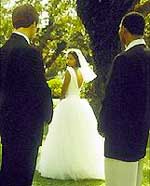
As we speak, there is no word yet of a verdict in the trial of Oprah Winfrey in Federal District Court in Amarillo, Texas, on charges of having defamed beef patties. After listening to a Montana cattle rancher worry about mad-cow disease on her syndicated talk show in April 1996, Winfrey told a studio audience and millions of viewers: “It has just stopped me cold from eating another burger! I’m stopped!” The next day, cattle futures prices fell from 62 cents to 55 cents a pound. Other futures prices plunged, too, unrelated to red meat, but a thundering-hoofbeat lobby aligned with the Texas Beef Group sued Winfrey for $12 million anyway, under the False Disparagement of Perishable Food Products Act of 1995.
I am not here to discuss the constitutionality, not to mention the chilling effect, of libel laws to protect whatever chemicals the food industry sticks into our fodder to Twinkie its shelf life past Armageddon. Nor will I discuss bovine spongiform encephalopathy and Creutzfeldt-Jakob disease or even vegetarianism. I am here instead to celebrate Winfrey. Those mystical powers imputed to her to unsell meat are indisputable when it comes to doing the opposite for books. If she likes a book in public, not only will her audience buy it, but it’s more likely to show up on film. And she’s admirably determined to use this clout on behalf of African-American literature. Whether we approve of what Steven Spielberg did to Alice Walker’s The Color Purple, Winfrey wanted a role – and surprised us by deserving it. While we may be dubious about her casting herself as Sethe in the forthcoming big-screen adaptation of Beloved, at least she bought the movie rights to Toni Morrison’s magnificent novel and hired Jonathan Demme to direct it. She brought Gloria Naylor’s The Women of Brewster Place to television and, in the starring role of Mattie, suffered enough to wear out God. Her Harpo Films production company is also at work on Zora Neale Hurston’s Their Eyes Were Watching God and Anchee Min’s Katherine. And this week, Winfrey executive-produces the mini-series version of Dorothy West’s The Wedding (Sunday and Monday, February 22 and 23; 9 to 11 p.m.; ABC).
West is the oldest surviving star of the Harlem Renaissance, that flowering in the twenties of black writers, artists, and musicians that included Hurston and Langston Hughes, James Weldon Johnson, Claude McKay and Jean Toomer, Paul Robeson and Bessie Smith. West was rediscovered, at age 88, by Jacqueline Kennedy Onassis, scouting for Doubleday in Martha’s Vineyard. The Wedding (1995) was West’s first novel in 47 years. It’s no Beloved, but it addresses incendiary issues Morrison herself has explored in both Tar Baby and Paradise. How much black is too much black for the social comfort of the mixed-race bourgeoisie? In the sandy summer of 1953, on the eve of the marriage of Shelby Coles (Halle Berry), the light-skinned daughter of a doctor, to Meade Howell (Eric Thal), a penurious white jazz musician, the Coles family and its neighbors in the “Oval” – a prideful community of wealthy black professionals in the Oak Bluffs section of Martha’s Vineyard where Dorothy West has passed so many decades – must face up to their own skin code and class snobbery.
On the one hand, Shelby’s matriarchal great-grandmother, Gram (Shirley Knight), has to be pleased that Shelby’s marrying white. Gram was herself the daughter of a slave owner. If her own spinster daughter was desperate enough to marry a black man, at least he was a college professor. Gram has made it her breeding business ever since to see that each succeeding generation be upwardly mobilized and lighter-skinned. Thus, her granddaughter Corinne (Lynn Whitfield) was married off lovelessly to the credentialed Clark Coles (Michael Warren) – whose own mother, Helen (Marianne Jean-Baptiste), happens to be a slumlord. When Clark and Corinne’s older daughter, Liz (Cynda Williams), fell in love with a too-black Lincoln Otis (Richard Brooks), his parents weren’t even invited to the wedding – and so the couple eloped, with Lincoln resolving never to set foot again in the Oval. On the other hand, Meade, while white, is unfortunately poor – and his parents refuse to attend his wedding to high-yellow Shelby. On the third hand, while Meade plays a sad piano, Shelby is strangely attracted to a dark and angry visitor to the Vineyard, Lute McNeil (Carl Lumbly), who proposes to dump his white wife.
To the glowering Lute at a country club, quite as if her own husband weren’t about to run off to Paris with his nurse, Shelby’s unhappy mother, Corinne, announces, “You can never buy background. You can’t rent breeding.”
These are ferocious ironies – tricked up for mini-series purposes in soap-operatic and Romance Classics haberdashery, with the usual lurid flashbacks. Halle Berry is much more assured as a troubled ingenue than she was as Alex Haley’s Queen, or playing Sheba to the Solomon of Jimmy Smits on Showtime. Lynn Whitfield, so splendid on HBO as Josephine Baker, deserves better than the status-scrabbling Coinne. Carl Lumbly, even on Cagney & Lacey, and Michael Warren, even on Hill Street Blues, have always been more complicated than the roles to which television assigns them. Shirley Knight, of course, is a monstrous marvel. How odd that the last gasp of the Harlem Renaissance after all these years should have come down to a pair of white victims – the wife and the jazz pianist – suffering the internal contradictions of the black bourgeoisie, as if history had turned the tables on the usual abusive partners. And how grateful we should be to Winfrey for giving us something in network prime time to think about, and to flinch from: a market exchange of identities.